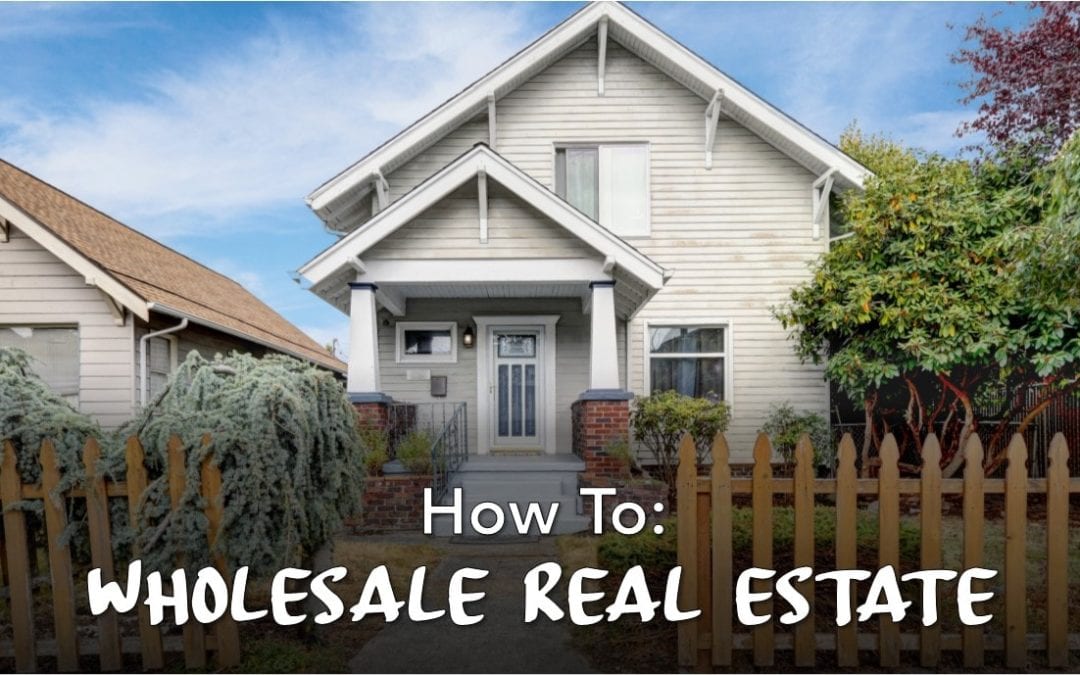If you want to get into real estate investing but don’t have enough cash to start flipping houses, or if you have more property leads coming in through your funnel than you can take on yourself, real estate wholesaling could be a great option for you. In this guide, you will learn what it means to wholesale real estate, how to get started, and strategies to maximize your profits as a wholesaler.
What Is Wholesale Real Estate Investing?
Wholesaling real estate is an investing strategy where an investor focuses on finding distressed properties or sellers who need to sell a property quickly, offers to purchase the property “as-is” with cash. once the wholesaler signs a contract with the seller, they either “assign” it to an end-buyer (if the contract has an Assignment Clause) before the contract closing date, or they perform a “double-close” where they close on the property with the seller on the same day that they sell the property to an end-buyer (using a separate sales contract). Wholesaling real estate exists in both the residential and commercial markets.
- Residential real estate wholesaling is when an investor buys properties in zones that are designated for residential living, including both single-family homes and multifamily properties (depending on the zoning ordinances).
- Commercial real estate wholesaling is when a wholesaler focuses on office and medical buildings or retail establishments including strip malls and restaurants. Again, depending on zoning ordinances multifamily properties could be considered commercial as well.
Pros and Cons of Wholesaling Real Estate
The benefits of wholesaling properties include:
- Get exposure to finding investment properties and negotiating contracts with sellers
- The potential to earn enough in “assignment fees” (your cut as a middle man) to purchase a property to fix and flip
- Quick turnaround between negotiating a contract and collecting your assignment fee
- Doesn’t require the time, money, or experience needed to successfully renovate a property
The risks of wholesaling are:
- Sellers may not want to sign an assignable contract, and double-closes require two sets of closing costs
- Some contracts may not let you out of the deal if you don’t find an end buyer
- It can be time-consuming, especially for beginners who don’t have a good buyer’s list for leads
- Income is not guaranteed and can be sporadic
Tips for Wholesaling Houses
It can take a lot of time and energy to wholesale residential properties, but there are ways to streamline the process and make it faster and require less effort.
- Get your pricing strategy down. The ability to buy and wholesale properties successfully depends on your knowledge of what the property will be worth after renovations are complete, and what that means you can put it under contract for. Savvy end-buyers won’t overpay for the property, so you need to know what your contract price, assignment fee, and a reasonable resale price will be. This all starts with knowing how to comp the end product (fully-renovated property).
- Use technology. Manage your buyer’s list with CRM software (customer relationship management). Create templates in your email to save time. Hire a virtual assistant online to help you find and manage leads.
- Talk money with your buyer and be direct. Collect earnest money and don’t accept personal checks. You need to protect your financial interest and make sure the buyer is committed to the deal.
- The fortune is in the follow-up. Keep checking in with sellers to see if they’ve changed their mind and keep in touch with your buyers so you know exactly what kind of home they’re looking for.
- Always ask for a referral. Sellers might know other people trying to offload properties; and if one buyer can’t afford to take on another project, they might be friends with another investor who would be interested. It can be a great source of warm leads and it’s always worth it to expand your network.
- Use an investor-friendly title company. You want to make sure they are knowledgeable about assignments and how wholesaling properties works. Keep in mind that if the title company requires you to do a double-close, it means you will be paying 2 sets of closing costs.
The Steps to Completing a Wholesaling Deal
- Find a distressed property. Use your network, drive for dollars, take out an ad, put up a sign, and do whatever you have to do. You can’t start wholesaling houses until you’ve identified potential investment properties.
- Make an offer that’s lower than market value. You may be working directly with the owner or with an REO or “real estate owned (meaning a property owned by the bank). Remember that motivated sellers are likely facing financial problems if they can’t sell the home. Be tactful and work to gain their trust.
- Get professionals involved. If you don’t have the cash to secure the property, you may need a lender to help with a Transactional Funding Loan so you can provide proof of funds to your seller. You’ll also need a title company and an appraiser.
- Estimate the costs of repairs. Even though you’re not going to be fixing up the property, you need to know how much it will cost to fix it up to get the pricing right. If you price too high, you’ll have trouble finding an end-buyer buyer and if you price too low you’ll be leaving money on the table.
- Find an investor to buy the contract. A wholesaler needs a buyer’s list with solid leads who have purchase funds ready to go in order to market the property quickly before the closing date of the initial contract (placed on the property by the wholesaler). You need to know who’s buying what kind of houses and which neighborhoods they are looking for.
- Assign the contract to the buyer. This is the step where you collect earnest money and where you include your assignment fee.
- Close the deal. The property settlement won’t take long and once the title is transferred from the seller to the new buyer you’ve found, your deal is done, and you can get paid. Settlement usually happens at the title company’s office and it’s the title company who will give you your check.
Frequently Asked Questions About Wholesaling Properties
Do you need a real estate license?
You don’t have to have a license if you’re the person named in the buyer’s contract. Real estate professionals collect a commission on property sales for facilitating the deal but are not named on the sales contract as a buyer or seller. Wholesalers are named on contract and they collect an assignment fee (not a real estate commission) from the buyer for transferring that contract.
What is an assignment fee?
It’s the difference between what a wholesaler gets the property under contract for from the seller and what the wholesaler assigns the contract to the end-buyer for. That dollar amount is the profits that a wholesaler collects in the transaction.
How much money can you make wholesaling real estate?
Your income will depend on how many houses you assign to end-buyers, and how large your assignment fee is on each wholesale deal. Generally, you can expect $5,000 at a minimum for each single home property, and a lot more for multifamily. The better you are at negotiating with sellers, perfecting your resale comps, and building your list of qualified buyers, the higher your profit will be.
Do you need money to wholesale real estate?
No. You can start wholesaling properties without paying a penny in down payments or making a big investment. Keep in mind that if you intend to use a transactional funding loan that you will need to pay financing fees in the form of either a flat fee or a percentage of the purchase amount. It’s also helpful to have some money for marketing, paying an assistant, and other incidental costs.
Who pays the closing costs?
The end buyer usually pays all fees including the closing costs and assignment fee. Many contracts also include marketing costs, title insurance, and other miscellaneous fees as well.
How do I become a wholesaler?
There aren’t any certifications or classes required. Anyone who can legally enter a contract can do it. All you need to do to start is to follow the steps outlined above, beginning with finding a motivated seller with a distressed property.
Before you start, you’ll need to do your research. It can be helpful to network with other real estate investors to ask questions and to get your team of professionals together. At the very least, you’ll need a lawyer to help you draw up contracts, a title company for your closings, and title insurance and a buyer’s list.

